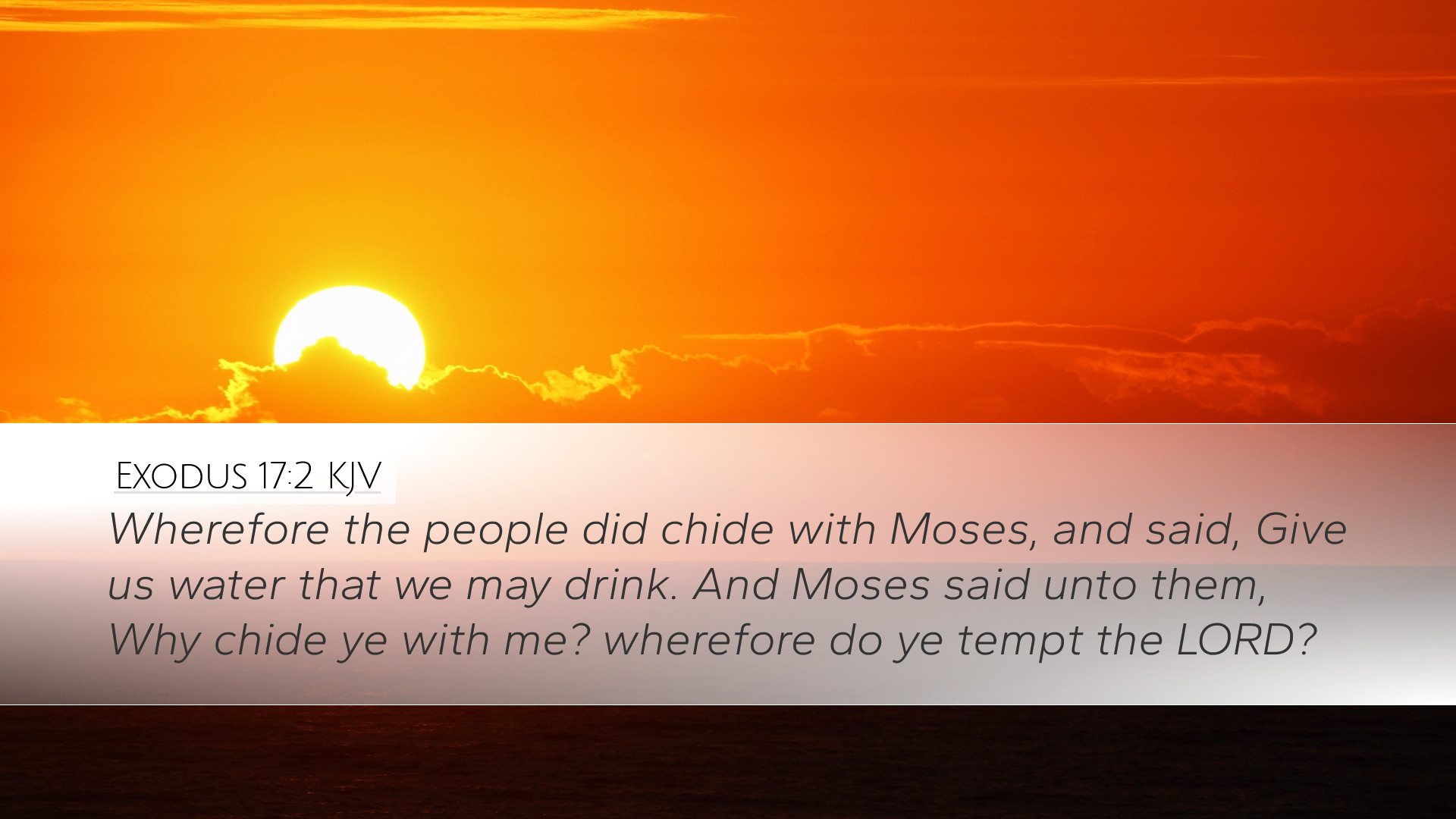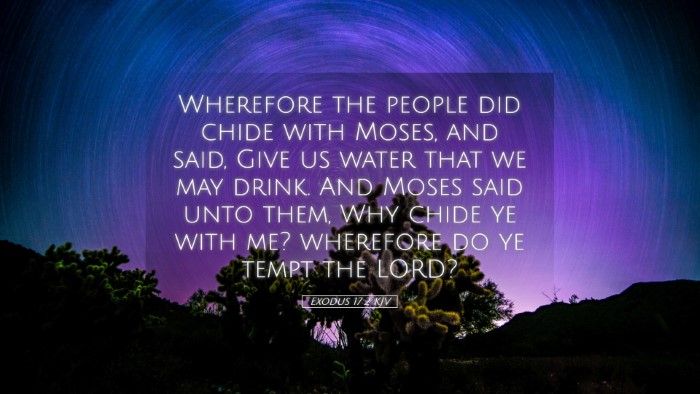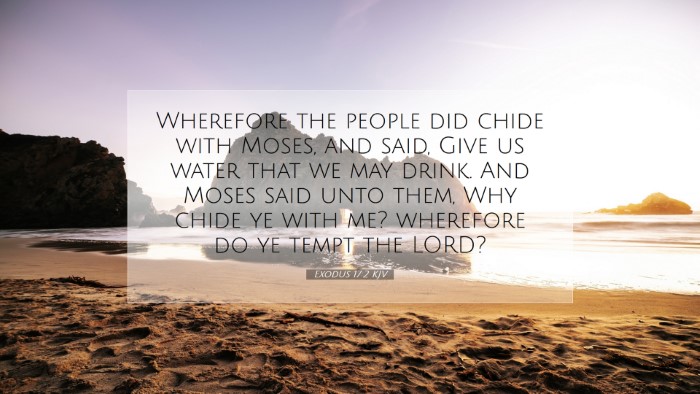Commentary on Exodus 17:2
Exodus 17:2 states: “Therefore the people did chide with Moses, and said, Give us water that we may drink. And Moses said unto them, Why chide ye with me? wherefore do ye tempt the Lord?” In this passage, we observe the Israelites' frustrations and their response to a lack of water during their journey in the wilderness. This scenario serves as an important focal point for understanding the nature of faith, human complaint, and the relationship between God, His chosen leader, and His people.
Contextual Background
This verse occurs in a critical phase of Israel's journey after leaving Egypt, aiming toward the Promised Land. The people had witnessed many miraculous acts, yet their faith wavered during hardships. The consistent theme of testing and trial surfaces throughout their journey, revealing both the weaknesses of the people and the steadfastness of God.
Insights from Jonathan Edwards
In interpreting this verse, Jonathan Edwards highlights that the complaints of the Israelites stemmed from their failure to trust in God's provision. He notes that while previous miracles of sustenance showed God's power and provision (such as the manna), the absence of water led to a strong sense of desperation among the people.
Matthew Henry's Commentary
Matthew Henry elaborates on the rebellion of Israel: “The Israelites chide with Moses not only as he was their leader, but because they saw no immediate solution to their pressing need.” He emphasizes the significance of the word "chide," indicating an emotional and accusatory outpouring that reflects deeper issues of faith and trust in God. Henry points out that this conflict reveals a trend among the Israelites to doubt God’s ability to care for them despite their past experiences of His miraculous deliverance.
Albert Barnes' Observations
In his commentary, Albert Barnes provides insights on the meaning of "tempt the Lord." He explains that by doubting God’s provision, the Israelites were testing God’s patience and faithfulness. He writes, “When Moses asks why they tempt the Lord, he reminds them that their complaints are not merely directed at him but are fundamentally an affront to God’s character and providential care.” This interpretation underscores how essential it is to maintain faith even in times of trial.
Adam Clarke's Explanation
Adam Clarke discusses the significance of the water metaphorically. He relates their thirst not just to physical need but as a representation of spiritual thirst. He states, “Their longing for water illustrates humanity's innate need for divine sustenance and guidance.” Clarke emphasizes that when the Israelites 'tempt the Lord,' they are also feeding into a cycle of discontent that can lead to spiritual dehydration if left unchecked.
Understanding Chiding and Its Impact
- Emotional Toll: The act of chiding shows a collective frustration that transforms into accusatory language. This reveals the interpersonal dynamics between the leader and the congregation.
- Faith Assessment: Chiding acts as a litmus test for faith. It raises questions about the Israelites’ belief in God’s promises, particularly their ability to provide sustenance in times of need.
- Leadership Challenges: Moses serves as a critical link between the Israelites and God, facing the brunt of their impatience and frustrations. His response is significant in that he turns their grievances back to God, reminding them of the source of true relief.
Theological Implications
This verse has profound theological implications about human nature, trust, and divine provision. The Israelites’ actions demonstrate a lack of comprehension of God’s continuous commitment to them.
God’s Faithfulness
“God’s faithfulness is unwavering,” Henry emphatically states. Regardless of Israel's complaints, He remains ever-present, prefacing the eventual provision of water in the subsequent verses. Their complaints could be viewed as a prelude to God’s grace despite the challenges of faith present in each individual.
Examination of Human Nature
The challenges faced by the Israelites reveal an enduring truth about human nature: “In the midst of want, doubt and fear often overshadow faith.” Thus, this passage serves as an encouragement for believers to reflect on their own responses to adversity, prompting a call to examine how they, too, may engage in spiritual chiding instead of seeking faithful engagement with God.
Practical Applications
For pastors and theologians alike, Exodus 17:2 provides a vital lesson in pastoral care and community engagement. Understanding the emotional landscape of congregational frustrations and the importance of directing complaints toward God rather than leaders can foster healthier spiritual environments.
- Encourage Open Dialogue: Create spaces where doubts and frustrations can be voiced without fear of retribution, emphasizing a supportive community grounded in faith.
- Exhort Faith Over Complaint: Teach communities to respond to needs with prayer and trust in God’s timing, reinforcing spiritual resilience amid adversity.
- Highlight the Role of Leadership: Leaders can model appropriate responses to challenges, showcasing that while frustrations are human, expectations of divine provision should `always` be maintained.
Conclusion
Exodus 17:2 offers rich commentary on the dynamics of trust, leadership, and human frailty. The Israelites' chiding of Moses represents deeper issues of faith and divine relationship. As believers study this passage, the reminder of God’s unfailing provision even amidst our doubts provides a timely call to engage with God faithfully, seeking His guidance and sustenance in every circumstance.


